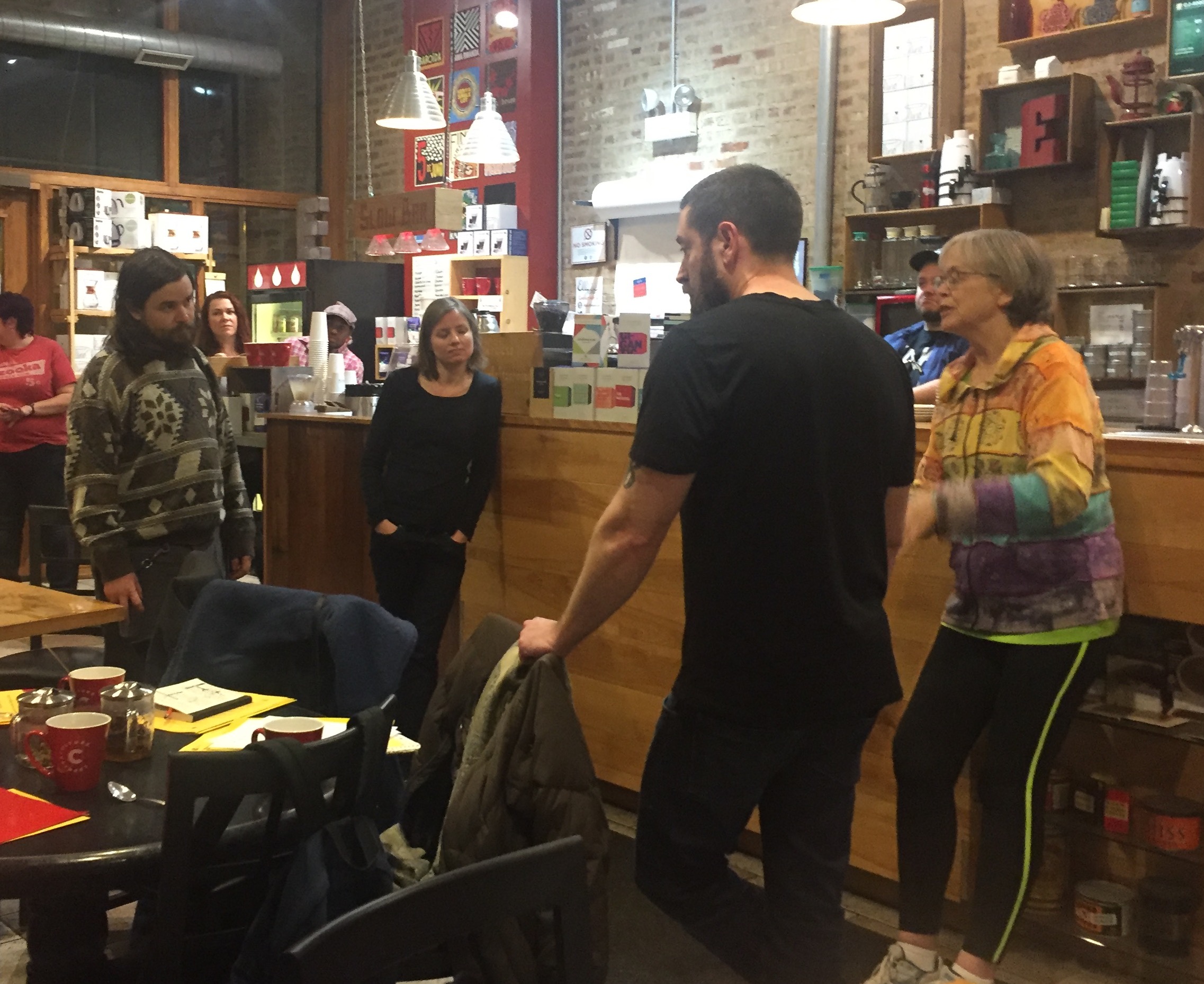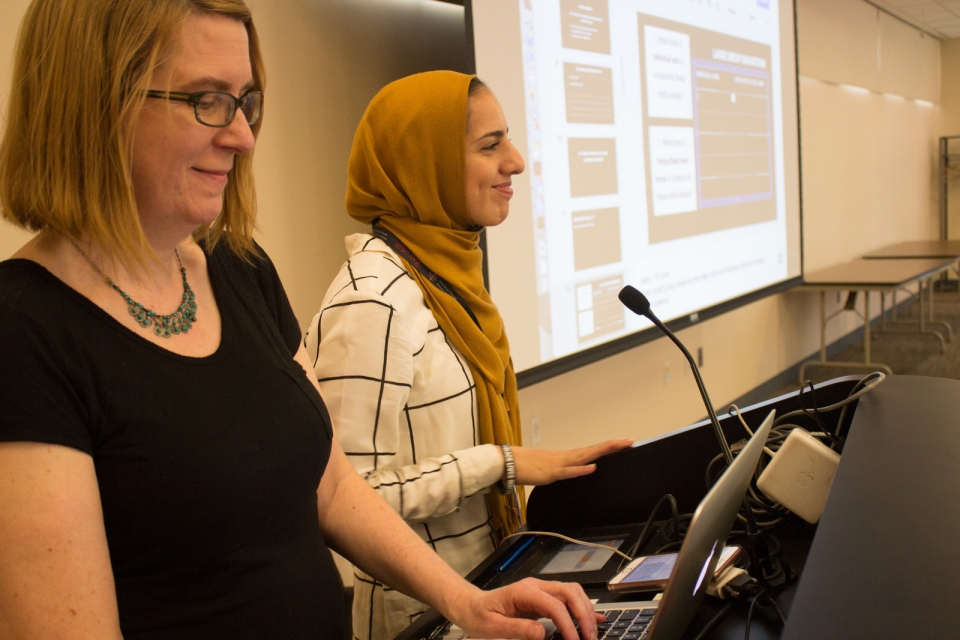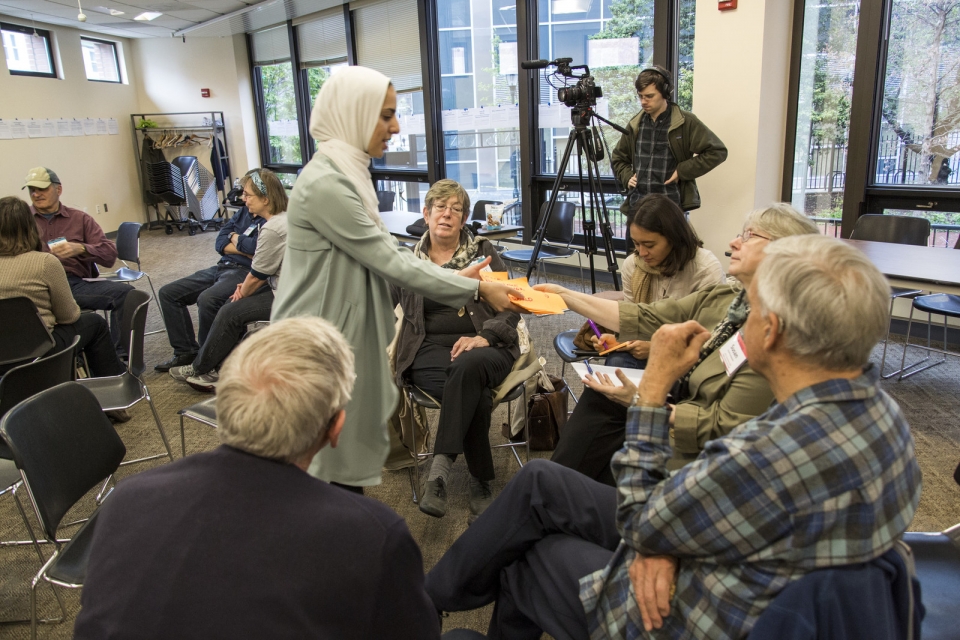
Participants do some role-playing at a recent Communities Against Islamophobia workshop in Chicago. Mary Zerkel / AFSC
A new AFSC project helps allies develop skills to stand with Muslims against hate and fear.
The dozens of people who showed up for our Communities Against Islamophobia workshop in Philadelphia last spring did not know quite what to expect. My colleagues—Dina El-Rifai and Gabriel Camacho—and I were facilitating the session, and among the participants were teachers and professors, social workers, local activists, and Quakers.
“Let’s break into groups,” I said after a short introduction. “Turn to the people around you, and talk to each other about commonly held beliefs or myths about Muslims.”
Several participants laughed nervously—not unlike the responses we had seen from attendees in previous workshops. I told attendees, “It may seem uncomfortable to say these things out loud, but this is the space to do that. Move into that uncomfortableness.”
Within the next 10 minutes, blue, pink, and yellow sticky notes dotted one wall—all examples of the harmful stereotypes associated with Islam. Workshop participants are asked to embrace some discomfort to learn—and the experience can be eye-opening.
Allies begin to see how anti-Muslim narratives aren’t present only in the crude rhetoric of white nationalists, but also in progressive and liberal messages, where they often go unnoticed. One attendee shared that “I’ve been challenged to listen harder, and watch more intently as to how I’m complicit in discrimination/Islamophobia.”
Difficult conversations like these are part of AFSC’s new Communities Against Islamophobia (CAI) project, which was launched last fall. CAI workshops help people understand anti-Muslimism within an anti-racist framework, gain tools to interrupt individual and state violence against Muslims, and connect with Muslim-led community efforts.

Currently, AFSC is working with Muslim-led partner organizations in four U.S. cities—Chicago, IL; Indianapolis, IN; Cambridge, MA; and Greensboro, NC—to train allies in understanding Islamophobia, or Anti-Muslimism, and developing strategies to stop it.
In the U.S. the fear of terrorism has historically been used to justify the racial and religious profiling of Muslims and people perceived to be Muslim. Since the election of President Donald Trump intimidation and violence have risen across the country—as have policies like the Muslim ban that discriminate against refugees and immigrants.
But we’ve also seen collective outrage in response to these acts—and growing interest in resisting alongside affected communities. Potential allies’ energy is welcome, but they need more context to not let their good intentions make matters worse.
The workshops examine historical context, media narratives, and national security policies over decades, helping participants see how the U.S. “war on terror” has effectively branded all forms of Muslim activity—political, religious, or otherwise—as form of potential terrorism. Participants also begin to understand how these narratives and policies have been repeatedly used to justify surveillance of the Muslim community, criminalization of Muslim youth, and military attacks on Muslim-majority countries.
For many people, taking part in a training is a meaningful first step in standing with Muslims to confront Islamophobia. Cecily Relucio Hensler, a participant in Chicago, was recently inspired to work with us to organize workshops for public school teachers so they can see how Islamophobia affects their students.
Cecily, a teacher educator at the University of Illinois Chicago College of Education, says, “Teachers committed to social justice need to develop understandings of the historical and structural roots of anti-Muslimism as well as the tools to name it and shift the narrative, so that they can empower youth to develop those understandings and skills as well.”
Other workshop participants leave with options for connecting to Muslim-led organizing efforts, tips to counter Islamophobic comments in everyday conversations, and resources such as our Do’s and Don’ts for interrupting public instances of anti-Muslim violence or harassment.
They’re all part of a growing community of committed individuals willing to join Muslims in opposing policies driven by hate and fear.
Q+A: Perspectives from AFSC's Communities Against Islamophobia staff

We asked AFSC’s Dina El-Rifai (Washington, D.C.), Sofia Sami (Chicago), and Umaymah Mohammad (Indianapolis) to share their experiences as facilitators of Communities Against Islamophobia workshops. Here are some of their responses:
How do you describe CAI trainings and goals?
Umaymah: I usually describe it as all of us acknowledging that racism and Islamophobia are real. That’s where this training starts—having that really basic understanding.
Dina: Our broader goal is to help people recognize that when we feed into the narratives of fear and suspicion, we feed the cycle of militarism and racism.
Sofia: Islamophobia is often portrayed as individualistic—people harassing Muslims in public, on the street or on the subway. Our training helps push people toward understanding Islamophobia as active state violence—part of a system that includes white supremacy, misogyny, and imperialism.
Are parts of the training particularly challenging for participants?
Sofia: Many non-Muslims don't realize that this Islamophobia isn't just happening post Trump or even post-9/11. This is the historical way domestic and foreign policy has been shaped. Anti-Black, anti-brown, and anti-migrant violence is deeply tied up with anti-Muslim violence.
Dina: People are being challenged to think about the ways that they’ve been socialized to think about Muslims—“war on terror” policies, perceived fears and suspicions, what “security” means (and who it protects, and at what cost), and the way that state policies [communicate] how certain groups of people “deserve” to be treated. If these wheels start turning in people’s minds, even the slightest bit, then these trainings are effective.
What are some tips for people who want to be effective allies in standing against Islamophobia?
Umaymah: My number one tip: Listen to affected communities. If you can do that, you can be a good ally. There will naturally be some points of contention. For instance, some people may want to abolish the police. When someone from the affected community speaks, listen to it, whether you believe it or not. Sit in your turmoil, and let it wash over you. You may hear that the police killed their brother, which is why they feel the way they do.
Sofia: A lot of people want to get involved—particularly white people—who may not be accustomed to centering people who are impacted. We help participants develop those skills to stand with Muslim communities and other people directly affected by these issues, which are skills that they can apply to other areas of their organizing.
Why are you personally invested in this project?
Dina: As an Egyptian-American Muslim, I have never feared for my and my family’s safety and security more—Trump’s policies and actions put many of us in danger and put our civil liberties at risk. I feel blessed with the opportunity to do this work with AFSC and to empower myself with knowledge and experience during such a critical and scary time. I think what’s important here is continuing to highlight the intersections between marginalized communities and the larger systems and policies that have long been normalized to create the political environment we find ourselves in today–that is what builds power in movements and creates change and that is what we are doing with this project.
Umaymah: At the end of every training, everyone is exhausted, but people still come up and tell me “Thank you for the training.” As a Muslim, people actually trying to take steps to challenge these policies to become allies in our communities—it means a lot. Every time I do a training, it reminds me, here are 20 more people in Indianapolis who care about these issues, who care about us.
This story was published in the summer 2017 issue of Quaker Action: Resources for Resistance. Read the full issue.